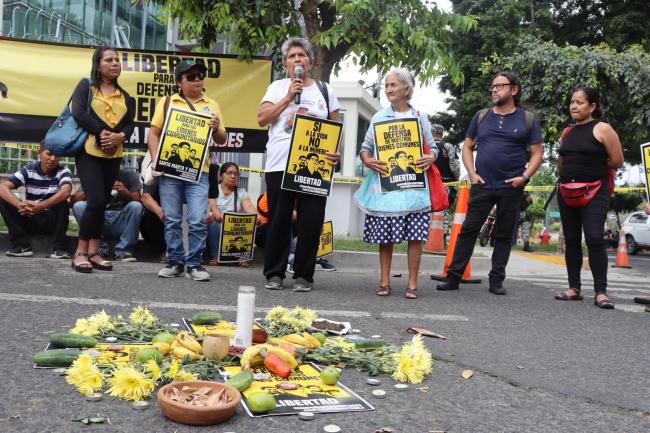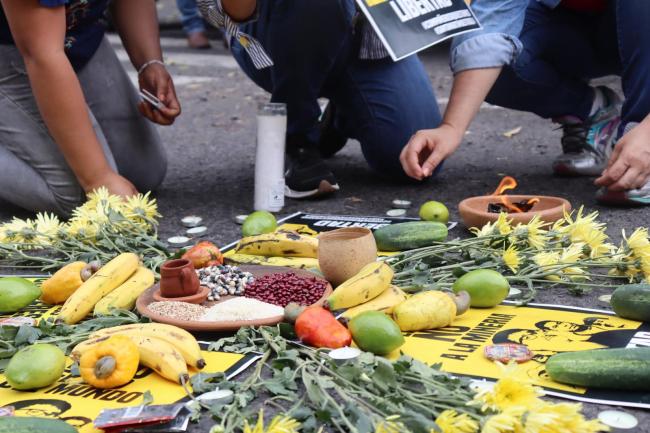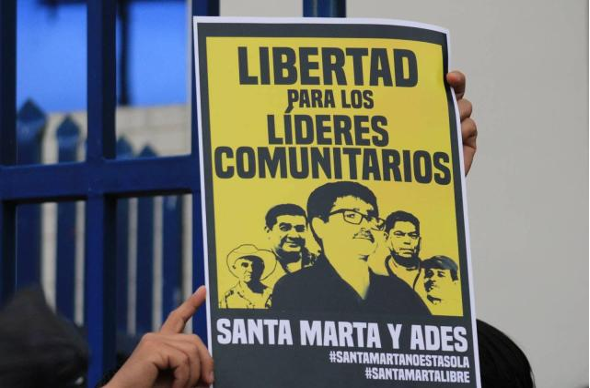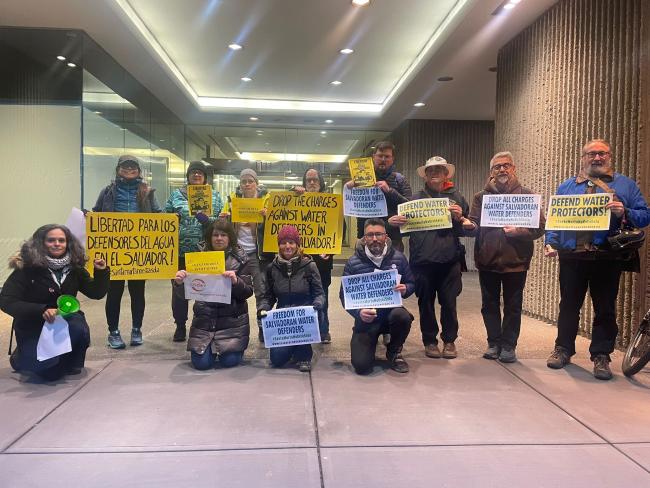
In an April 10 court hearing in San Salvador, a presiding judge chose to uphold charges against five anti-mining activists. The Santa Marta Five, who were arrested in January 2023, will be tried at a later date for “illicit association” and an alleged murder that took place over 34 years ago amidst the Salvadoran Civil War. For their supporters, the Bukele’s right-wing administration is actively targeting the five water defenders to punish them for their instrumental roles in the country’s historic metals mining ban in 2017.
The five were granted house arrest in August 2023, and will remain under house arrest as they await the scheduling of their trial. In response, the international community has shown unwavering solidarity and is united in calls for justice, with 245 organizations from 31 nations urging Salvadoran authorities to dismiss the charges. Advocates are concerned by the possible motives for the water defenders’ criminalization which poses a threat to the mining ban.
Teodoro Antonio Pacheco, Saúl Agustín Rivas Ortega, Miguel Ángel Gámez, Alejandro Laínez García, and Pedro Antonio Rivas Laínez—the individuals making up the Santa Marta Five—are well-established community leaders who fought with the FMLN against El Salvador’s US-backed military dictatorship in the 80s. They rebuilt their community from the rubble of civil war during the 90s and organized to defend their precarious water resources from foreign mining companies in the 2010s.

For example, Pacheco—the director of the Santa Marta Association for the Economic Development of El Salvador (ADES)—worked side by side with other advocates on forest conservation, community organizing, sustainable agriculture, and water management over the last three decades. ADES's efforts have provided vital services to tens of thousands in Cabañas, the department where the organization is located while opposing harmful initiatives like garbage incinerators and water project privatization. As one of the founders of the National Roundtable Against Metallic Mining, Pacheco, and the other water defenders, were instrumental in passing the 2017 ban.
El Salvador's historic decision marked a significant milestone, positioning it as the world's first country to take such a stand. This move stemmed from concerns over the adverse environmental and social impacts of mining on vital water resources, agriculture, and the country’s fragile environment. Grassroots activism—spearheaded by organizations like ADES and the National Roundtable Against Mining—played a pivotal role in raising awareness about the dangers posed by industrial mining for a country with some of the worst environmental indicators in Central America.
Politically Motivated Charges
The flimsy circumstances of the Santa Marta Five's detention raises concerns about the lack of legal rights in an El Salvador under Bukele. “It is outrageous that the judge is allowing this trial to go forward despite the lack of any evidence of a crime,” said John Cavanagh, Senior Advisor at the Institute for Policy Studies.
The Salvadoran government has failed to provide any new evidence of guilt for the water defenders. The defense team has argued that except for the testimony of a secret witness who contradicted himself when cross-examined, the Attorney General has failed to provide evidence that links the defendants with the murder. Yet the judge ruled a highly unusual gag order on the case and preventive detention, changed to home detention after eight months under barbaric jail conditions, for the defendants while it allowed lawyers for the Attorney General up to a year to conduct further investigations to make their case. Legal expert Luis Parada has also argued that these charges violate the 1992 National Reconciliation Law, which provided limited amnesty to ex-FMLN combatants to allow them to depose their arms and transition into civilian life.
The timing and motivations behind these arrests come as Bukele enjoys a wave of popular support that has allowed him to consolidate his grip on the country based on his hardline war on gangs. Still, it struggles to keep the Salvadoran economy afloat.
Changing Peace Agreement Narratives
The signing of the peace agreements in 1992 put an end to 12 years of brutal civil war and a longer cycle of violence and dictatorship going back to the 1930s. This new beginning committed the warring factions—represented by the two dominant parties, ARENA and FMLN—to fostering a democratic system, curtailing the role of the military, and putting the control of the police under civilian command.
But the promise of the accords quickly crumbled under the weight of a neoliberal economic system, imposed by multilateral lending institutions that privatized state-owned enterprises and services and incentivized foreign investment at the expense of labor and environmental regulations. Over the following decades, chronic social problems like gang violence, mass migration, and rampant corruption took hold. For the population, a shift to FMLN rule after 20 years of ARENA in power brought no significant perceived changes.

Bukele, a self-proclaimed crusader against the “same old politicians,” rode the wave of apathy and disillusionment with the post-war status quo. But the president has sought to redefine the narrative of the war for his political gain. He has called the peace accords a "farce," and his allies in the legislative assembly have scrapped the official commemoration of their signing. More recently, a judge has ordered the detention of the legislators behind the 1992 Amnesty Law that shielded civil war perpetrators from prosecution. Among the detained is the renowned left-wing politician and diplomat Ruben Zamora, who was part of the commission but refused to sign the law.
State of Exception: Wider Implications for Human Rights and Democracy
Bukele took office in 2019, pledging to combat crime and gang activity and break away from traditional political factions. Since then, his controversial tactics—such as negotiations with gang leaders, imprisonment of political enemies, attacks on the media, and smear campaigns against civil society organizations have drawn significant criticism.
He first declared a "state of exception" in 2022 which suspended constitutional rights for all Salvadorans and granted authorities sweeping powers to detain individuals indefinitely without the right to due process. Despite Bukele's success in curbing crime and gang violence, the now permanent suspension of civil and political rights has been denounced as a threat to human rights and the rule of law. According to government figures, over 75 thousand alleged gang members are currently in jail, the majority of them awaiting to see a judge for the first time, have no legal representation, and have no contact with their families. Human rights organizations have reported that over 20 thousand of those detained are innocent and have no links with gangs and at least 245 detainees have died under suspicious circumstances.
In January, exactly one year after the arrest of the Santa Marta Five, the Institute for Policy Studies and the Share Foundation released a fact-finding report titled “State of Deception” detailing how Bukele’s administration has curtailed environmental activism and human rights. Experiencing continuous "states of exception," citizens live in fear amidst widespread military presence and surveillance tactics. And while these tactics are touted as a way to combat gang violence, there is little doubt that extractive, economic interests are at play here as well.
Bukele's Regime Aims to Restart Mining Projects
The Bukele administration appears to be considering overturning the ban, possibly driven by economic pressures and the desire to attract foreign investment amid economic challenges.
“Under Bukele, El Salvador is facing slow growth, minimal foreign investment, and record-high public debt,” said Alfredo Leiva, an activist who has been vocal in denouncing the detention of the five leaders. The current government has launched extractivist projects including bitcoin mining, sugarcane production boosts, and large-scale tourism. Leiva, who is also the secretary of ADES, said, “Given the economic crisis's threat to Bukele's popularity, it's plausible the government seeks to reintroduce mining for foreign investment. To achieve this, Bukele may aim to neutralize perceived opposition forces.” Going after the Santa Marta Five is exactly what this opposition neutralization looks like. The fact that these leading anti-mining activists were also part of the rebel forces during the 1980s civil war provided Bukele’s Attorney general the perfect excuse.

Environmental organizations, however, are not buying it. Since 2019, members of the National Roundtable Against Metallic Mining have been denouncing the Salvadorean government’s gradual interest in repealing the mining prohibition law. In December 2019, social organizations questioned El Salvador’s adhesion to the Intergovernmental Forum on Mining, Minerals, and Development, a multilateral organization that promotes “responsible mining” funded by the Canadian Government. Since then, the government seems to be installing administrative capacity for the reintroduction of mining. The 2023 budget allocated $4.5 million to modernize the mining and energy laws and, according to the 2024 budget projections, the government will be adding 140 staff members to the Directorate of Hydrocarbons Energy and Mines.
Additionally, companies linked to the corporate structure of OceanaGold, the multinational corporation that once owned the El Dorado mining project in Cabañas, have been found legally active in El Salvador. Communities in Cabañas have also denounced that land licensed to mining companies prior to the ban was sold last year to an anonymous company that ostensibly purchased the land for farming in an area that is classified as El Salvador’s least arable land.
International Cries for Justice
International organizations and advocates recognize the Santa Marta Five’s essential contributions to safeguarding human rights and the environment, and demand that charges against them be dropped. The withdrawal of the state of emergency and the implementation of a genuine public security policy are needed to restore suspended rights, and ensure the independence of the executive, legislative, and judicial branches of the state—all of which are crucial for democracy and the rule of law.
The 2017 prohibition on metal mining must be upheld to protect the country's water supply and honor the people's will. To further these efforts, the governments of the United States and Canada are urged to take immediate action by advocating for dropping the charges against the Santa Marta Five, acting as international observers, and refusing to provide financial assistance that could undermine human rights and democracy. Advocates also urge Canada to adhere to established guidelines supporting human rights defenders.
The coordination of international efforts could play a key role in justice for the Santa Marta Five and the enforcement of the rule of law in El Salvador. Organizations in Germany, Honduras, Canada, the United States, as well as the Latin American Group, continue showing unwavering solidarity toward the Santa Marta defenders. As Mary Lawlor, UN Special Rapporteur on Human Rights Defenders, continues to monitor this case, global visibility and show of support will be more crucial than ever to contest the unfair Salvadoran court's ruling.
The arrest of the Santa Marta Five folds into a broader pattern of political suppression aimed at shifting the blame for civil war crimes away from the military and towards civilians who organized under the FMLN. The UN Truth Commission found that the former committed 85 percent of war crimes.
The targeting of activists and community leaders who dissent against government policies reflects a worrying path toward authoritarianism, impunity, and reversal of crucial democratic gains. After Bukele’s February re-election—which many have deemed unconstitutional—local activists worry that the regime will intensify its campaign against civil society organizations.
International solidarity actions have become a crucial lifeline for environmental defenders in El Salvador. At the start of this year, International Allies hosted a week of action: a coalition of academics, lawyers, and organizations from various countries came together in support of the Santa Marta Five. On January 4, 185 academics and lawyers, along with 13 organizations from 21 countries, published an open letter to the Attorney General of El Salvador. They criticized the lack of evidence and due process in the case and raised concerns about the selective violation of the National Reconciliation Law. Support for the imprisoned Water Defenders' release extended to rallies held on January 10 in Ottawa, Toronto, Vancouver, and Washington, DC. Various organizations participated, including the International Allies Against Mining in El Salvador and the United Church of Canada.
As the solidarity of global voices amplifies those of activists who bravely defend their communities and the environment against authoritarian actions, the arrests of the Santa Marta Five go beyond individual injustices. The outcome of the defenders’ legal proceedings will gauge the state of democracy and justice in El Salvador.
Images in this article are courtesy of Santa Marta Association for the Economic Development of El Salvador (ADES Santa Marta) and Mesa Nacional frente a la Minería Metálica en El Salvador.
Giada Ferrucci is a Ph.D. Candidate in Media Studies specializing in Environment and Sustainability at Western University, Canada. She is a researcher for the "Surviving Memory in Post-War El Salvador" project and consults with the Central American Alliance on Mining (ACAFREMIN).
Pedro Cabezas is an environmental activist based in El Salvador with experience working in Canada, Cuba, and Central America.

